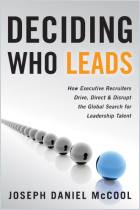Únase a getAbstract para acceder al resumen.

Únase a getAbstract para acceder al resumen.
Nancy Garrison Jenn
Headhunters and How to Use Them
A Guide for Organisations and Individuals
Bloomberg Press, 2005
¿De qué se trata?
To find an executive, act like one and hire a headhunter. Here’s how to get your prey (and keep your scalp).
Recommendation
When you want to hire an executive, you need a specialized headhunter or recruiter. And if you are an executive job candidate, you may want one, too. Nancy Garrison Jenn’s book serves two distinct purposes. The first section, about one-quarter of the book, deals with recruiters. Jenn explains how they work, and what they do for both employers and candidates. The second section is an extensive list of top headhunters worldwide, and that may need updating. Jenn’s approach makes this manual very practical for corporations seeking executives and executives seeking corporations.
Summary
About the Author
Nancy Garrison Jenn owns a consulting firm that tracks executive search activities for multinational firms. She lectures to M.B.A. students in Europe and the U.S., and has written about the executive search industry for the Economist’s intelligence unit.




















Comment on this summary